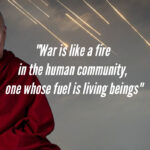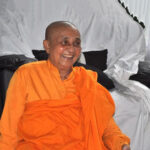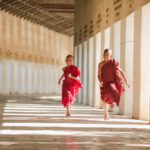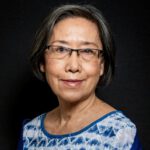[et_pb_section admin_label=”section”][et_pb_row admin_label=”row”][et_pb_column type=”4_4″][et_pb_code admin_label=”Code”]<iframe src=”https://e.issuu.com/anonymous-embed.html?u=carlfredricksen&d=seeds_of_peace_v34_n3_4preview” width=”944″ height=”500″ frameborder=”0″ allowfullscreen=”true”></iframe>[/et_pb_code][et_pb_text admin_label=”Text” background_layout=”light” text_orientation=”left” use_border_color=”off” border_color=”#ffffff” border_style=”solid”]
Hello Friends and Readers, Thank you for your interest in the third and final issue for 2561 (2018), which contains a constellation of
articles and other writings for you. In Ajarn Sulak’s cover story entitled The True Human: The Path to Morality in Human Society, he wrote
about how fortunate he was that his first kalyanamitta – virtuous companion – which was his father. Ajarn Sulak said that his father always treated him like an adult, and “laid the groundwork for the development of moral courage in me, especially the capacity for fearless speech and empathy for other people.” His article emphasizes that mental training guides moral training and contributes to the understanding of the causes of suffering.
Ajarn Sulak’s article is the speech he gave on 23 June 2018, at the Jee Jin Foundation, Bangkok, commemorating their 60th anniversary. Our friend, Craig Lewis, conducted an in-depth interview with Venerable Pomnyun Sunim of South Korea, which is most inspiring and provides insight in to his personal journey and beliefs. Through Lewis’s thoughtful
questions, Venerable Sunim shared how one day near the end of a school year a monk challenged him by asking the
provoking questions: Where did he come from?, and Where was he going? Then “Suddenly, the monk shouted at him asking: ‘Well why are you so busy if you don’t even know where you’re from or where you’re going?!’” These questions reached before his birth and after his physical death and send him on the path of self-discovery and of understanding
human suffering.
When Lewis asked Venerable Sumin about his thoughts on the path to peace regarding in current day relations between North and South Korea he said: “I believe we are very close to success because we have experienced failure before. We failed in the past because we thought it would be easy, we applied overly simple approaches. But by learning from our failures we can plan our approach more
carefully.” [ . . . ] “We could easily fall back into war and hostilities, or we could use this opportunity to resolve age-old conflicts. [ . . . ] If peace can be established, then security and order can follow, not only on the Korean Peninsula, but throughout East Asia.” Jane Rasbash, another close friend, wrote about the Wild Boars’ fighting spirit that kept them alive while trapped
in the flooded cave in Northern Thailand.
Their plight and rescue effort drew international attention with support arriving spontaneously to aid the Thai rescue team and families. Jane shared how Coach Ekk prepared the boys with the skills, determination, and inner and outer discipline that contributed to their survival. One of the boys, Chatthahan Saklakul, said that, “Pi Ekk is a good coach because he
does not put pressure on us – he taught us to meditate for a few minutes to calm down and have concentration before a game.” Even after the successful rescue mission was over the boys and their coach “showed humility, gratitude and a determination to be good citizens.” As Jane said, “there is much to learn from the respectful and humble way the coach and the young boys conducted themselves.” The first Sombath Somphone Public Lecture was delivered by our close friend Lahpai Seng Raw, founder
of Metta Development Foundation in Myanmar. Her presentation took place during the 7th Chula-ASEAN Week and 4th Parliamentary ASEAN Community Forum when she spoke about ASEAN responses to historic and contemporary social challenges. She clearly stated that, “it is unrealistic to expect the psychological and physical pain caused by an unjust, oppressive system to heal and go away
on its own.
The root causes for the pain need to be addressed, for as long as the culture of inflicting pain with impunity is
allowed to exist, the pain will continue to grow, without ever having a chance to heal.” Seng Raw concluded by saying, “With common enterprise, the situation is not without hope, and we must ensure that future generations are able to truly enjoy freedom and peace. In contrast to the failures of the past, that should be our contemporary legacy today.” Please read the country reports, and other writing on
various topics such as the new initiative on female Buddhist leadership for social transformation, the recent account of the School for Wellbeing, and the piece on the international conference on Buddhism, suicide prevention, and psychospiritual counseling. Ajarn Sulak has also give us some timely and relevant suggestions for the newly appointed Thai Sangha Supreme Council to consider and implement.
For those of you who are members of INEB’s Advisory Committee and Executive Committee, our next meeting will be in Kathmandu, Nepal, for three days from November 28 – 30. During the first day 3 separate panel discussions will explore several topics specifically about Nepal to prepare the members for the meeting. These topics include a situational analysis of Nepal’s Buddhist communities and
Dalit communities, as well as education for empowerment and spirituality. Members will also visit schools in Buddhist temples and ancient cultural sites. We at Seeds of Peace send you wishes of joy, happiness and harmony as 2018 comes to an end and thank you for your continued support and good wishes through the year.
[/et_pb_text][/et_pb_column][/et_pb_row][/et_pb_section]





